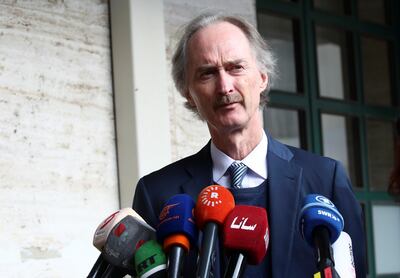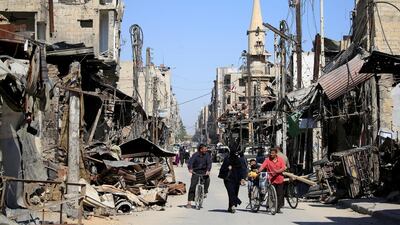Ending war is a labyrinthine process. In the 17th century, the treaty of Westphalia that stopped the Thirty Years’ War in Central Europe took four tortured years. Despite attempts at peace, it is estimated that 85 per cent of wars end by military victory. So heads of countries sitting down, conceding pieces of land and trying to write a new constitution between enemies while fighting is still going on almost always ends in failure. And when the winning side doesn’t want to concede anything, peace is impossible.
Peacemaking at best is about accepting standards that are lower than expected. Batna – or the best alternative to a negotiated agreement – is academic speak for what to do when negations fail. The acronym says it all. Alternatives need to be employed.
In Syria, attempts to end a war which has destroyed ancient Silk Road cities and claimed the lives of untold civilians – the UN stopped counting the dead in 2014 – are ongoing. Something needs to shift before the start of another disastrous winter. The Syrian Observatory for Human Rights says the death toll since the start of the war has topped 511,000. In addition, 6.6 million people have been displaced internally and 5.6m around the world, according to the United Nations High Commissioner for Refugees.
Last week, a second round of Syrian talks ended in Geneva. These UN-brokered talks were meant to be the start of a long road of political rapprochement followed by elections but they ended without a consensus and without a meeting of the group of 45 delegates meant to be negotiating on the constitution.
The 150-member committee composed of three varied groups – opposition, regime and civil society – was meant to usher in a new phase of diplomacy, an attempt to once again end the war. It was meant to amend Syria's constitution.
It was never going to be perfect but the talks were all we had to end the war. The result last week was to be expected. According to sources, the government delegation failed to present its own agenda and tried to shift the discussion away from the constitutional reforms.
Whose fault is it? The regime appears to be hampering the process. It doesn't want to be there. Its ally Russia urged it to be there, but the regime is bent on doing everything it can to destroy any attempt at peace. Opposition members say they proposed a working plan in good faith to address the general structure of the constitution and its chapters. They apparently suggested discussing the leading principles of the constitution.
The regime shot them down. "Since the beginning of the second round, we made five proposals within the scope of the constitutional committee and its authorities. All five were rejected by the regime. We will continue to present new proposals in order to find a solution," Hadi Albahra, co-chair of the opposition side on the committee said last week.
In October when the talks started, all three sides were meant to work on "solid, initial discussions and commonalities to build", according to Geir Pedersen, the UN's special envoy for Syria. But solid was the last word to describe talks where one side was completely intractable. On Friday, Mr Pedersen said, "disagreement is typical in such cases".

But there is a major thorn in the side of any talks. The co-chair from the regime side, Ahmad Kuzbari, has always said there must be national constancy – that is, that the Assad regime remains in power.
This is a key issue and will always remain the biggest stumbling block. The opposition cannot stomach a post-war government in Syria in which president Bashar Al Assad, whose family has reigned for nearly half a century with vast impunity, continues to govern over his blood-soaked country. Investigations have proven that his regime has used torture and targeted and bombed civilians, including doctors, hospitals and schools.
Does the regime really need to sit down to talks? After all, it is winning. And so its strategy seems to be to stall the talks. Most Syria insiders wonder whether Mr Al Assad will be willing to cede much in any negotiations when he already has so much of the country under his control. "There doesn't seem to be the seriousness or the commitment to really work on a new constitution," says Bassma Kodmani, a lawyer and a member of the opposition.
Meanwhile here is what the military face of war looks like in Syria: another winter coming, endless bombing, displacement in the Idlib region and millions of refugees outside the country who want to go home.
Of all the wars I have reported, I have always resisted attending peace talks. To me, they meant little and had nothing to do with what was happening on the ground. The UN officials, the diplomats and lawyers representing the people were far removed from the soldiers, housewives, fathers, mothers and students I met who were actually living through war. How could people sitting in Geneva – many of whom have lived in exile from Syria for years – know what someone being bombed in Idlib needs?
And yet, the urgency to end Syria’s agony has never been more crucial. We are entering the ninth winter. Nine years is too long for a country to be torn apart.
Mr Pedersen, tasked with ending the war, has taken a more low-key form of diplomacy than his predecessor Staffan de Mistura, the Italian-Swedish diplomat who tried for nearly four years to broker peace.
The implications of what Mr Pedersen does now are huge and he must persevere. He must pressure the regime to stop thwarting the peace process. What happens next in the region and indeed in the future of ending wars is being scrutinised in Geneva. It is time for all parties to lay down their egos and do what is necessary for their bleeding country.
Janine di Giovanni is a senior fellow at Yale and a Guggenheim fellow. She is the author of The Morning They Came for Us: Dispatches from Syria

